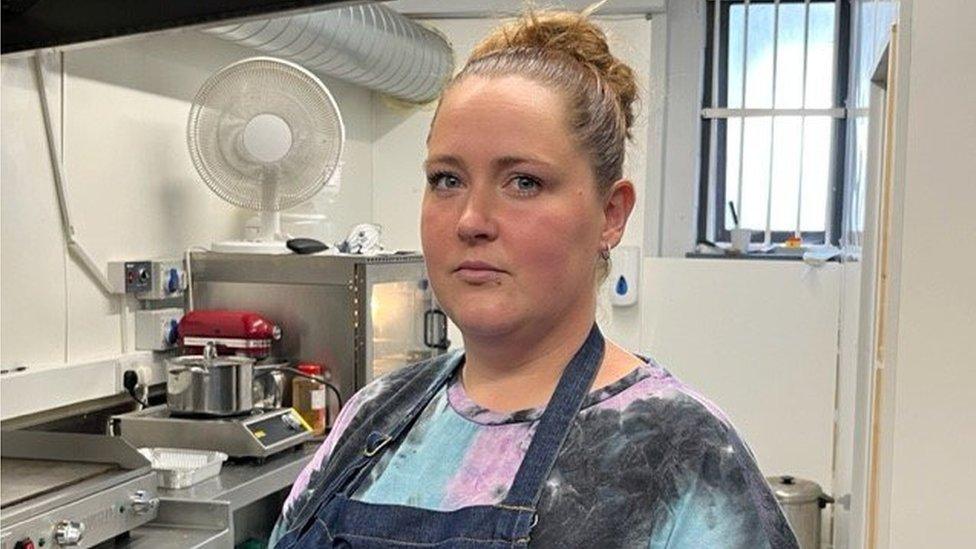Rising tide of homelessness could bankrupt seaside town
- Published

Nicola Skinner, her partner and their four children are among 500 families in temporary accommodation in Hastings
Councils across England spent more than ever tackling homelessness in 2022, official data released last week showed. BBC News has been to Hastings in East Sussex where hundreds of families are in temporary accommodation - a situation the local council says could push it into bankruptcy.
The Grumpy Café may not sound like the friendliest place to grab a coffee but inside the large, warm meeting place in the centre of Hastings, the atmosphere is anything but crotchety.
"My children call me the grumpy cook, and I thought, 'I like that,'" says owner Barry Ashley.
The not-for-profit café is busy most mornings, as locals pop in for coffee and cake, or a more substantial cooked breakfast. The money made is used to help locals with ever-increasing needs, particularly homelessness.
Every evening Mr Ashley, 60, cooks meals for families in temporary accommodation who don't have cooking facilities in their rooms: "It breaks my heart to see the conditions they're living in. It's really heartbreaking."
It is an issue close to his heart as half of the Grumpy Cook's eight staff are in temporary accommodation - a home provided by a local authority, often in the private rented sector, supposedly for a short period, but often for years.
Sharing a bed
Barista Keira Boorman has been living in a one-bed flat since her 19-month-old daughter was born, and it's a squeeze: "She can't have her own bed because there's not enough room. She spreads herself across the bed, moving constantly. I don't get much sleep."

Keira Boorman has to share a bed with her toddler daughter
The 19-year-old became homeless after she was no longer able to live with her mother. Despite working at the Grumpy Cook, she has little hope of finding a place to call her own.
"Most two-bed flats are around £950 a month and making that is nearly impossible as someone who doesn't have a silly amount of savings or earnings." she says.
"I don't have a guarantor either. They'll give me a viewing, but then pass it [the flat] on to to someone else."
Bankruptcy looming
It's a familiar tale throughout Hastings, a fading seaside resort, among the poorest towns in England.
More than 500 local families cannot afford a home and are in need of temporary accommodation, a situation that could push Hastings Borough Council into bankruptcy. This small district council will spend £5.6m housing them this financial year, a quarter of its entire budget.
House prices have almost doubled in Hastings over the past decade, one of the largest increases in England. At the same time, private rents have soared and the Local Housing Allowance, the maximum amount of housing benefit tenants can receive, has been frozen by ministers since 2020.
"We didn't have a single two-bedroom flat advertised at local housing allowance rates last year," says Chris Hancock, director of housing at Hastings Borough Council. "There is a strong risk this could bankrupt the council. We cannot make our budget stack up if we continue to have to spend this amount of money on temporary accommodation."

Barry Ashley says conditions in temporary accommodation are "heartbreaking"
The council is spending £11m buying properties to use as temporary accommodation, reducing its need to pay the ever-rising costs private providers are able to charge. Adding to the problem are the 900 properties available for short-term let, on sites such as Airbnb.
There is a bitter irony to the situation Hastings finds itself in. A decade ago, London councils were moving their homeless families to the town, as accommodation there was both available and affordable.
Figures released by the Department for Levelling Up, Housing and Communities last week show councils in England spent a record amount of money last year tackling homelessness.
It shows at least £2.4bn was spent tackling the problem in 2022/23. More than £1.7bn of that was used to pay for temporary accommodation.
The data also revealed:
Overall spending on homelessness increased by 10.5% since 2021/22
For those council areas that reported data for both this year and last, costs have increased in 192 of 232 areas
The biggest increase was in Liverpool, where the cost of tackling homelessness increased by 341% in one year, to £17.2m
Costs in Warrington increased by 210% while in councils Wolverhampton and Darlington saw their costs double
Back in the kitchen of the Grumpy Cook café, Nicola Skinner is helping Barry Ashley cook sausage and mash. The 33-year-old, her partner and their four children were made homeless in April when her landlord decided to sell the property.
The family consider themselves lucky, as the temporary accommodation they've been placed in allows their children to stay at the same schools. However, Ms Skinner knows the council could move them on at any point and fears they won't find anywhere affordable to rent.
"A few of them [letting agents] want incomes of 30 times the monthly rent, which is impossible to reach in Hastings," he says. "Our town is too poor to reach the prices they're trying to charge."